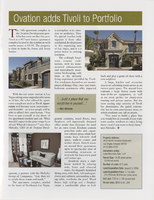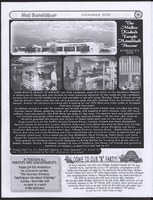Search the Special Collections and Archives Portal
Search Results
Martha C. Knack and Omer C. Stewart Research Papers on the Pyramid Lake Paiute Tribe
Identifier
Abstract
The Martha C. Knack and Omer C. Stewart Research Papers on the Pyramid Lake Paiute Tribe contains materials collected by Stewart and Knack as research for their 1984 book,
Archival Collection

Transcript of interview with Mary Ellen Osborn Lake by Fred Wilson, February 18, 1951
Date
Archival Collection
Description
On February 18, 1951, Fred Wilson interviewed Mary Ellen Osborn Lake (born 1870 in Mercer County, Missouri) and her son, Thomas Lake (born 1889 in Missouri). Wilson first asked Mary Ellen questions about when she first arrived in Las Vegas, Nevada in 1904. Much of the relatively brief interview involved questions related to the first Methodist churches in Las Vegas and the Lakes’ involvement and recollections of the locations and members of the church community.
Text
Temple Beth Sholom Records
Identifier
Abstract
The records of Temple Beth Sholom date from 1945 to 2015 and include scrapbooks, photographs, bulletins, meeting minutes, by-laws, correspondence, and publications. The collection contains documentation of the Board of Directors, the Sisterhood, the Men's Club, the history of the congregation, events held by the temple, and construction of the temple building in Summerlin in Las Vegas, Nevada.
Archival Collection

Ashok Mirchandani oral history interview: transcript
Date
Archival Collection
Description
Oral history interview with Ashok Mirchandani conducted by Kristel Peralta, Cecilia Winchell, and Stefani Evans on March 11, 2021 for the Reflections: The Las Vegas Asian American and Pacific Islander Oral History Project. In this interview, Mirchandani discusses his early life in Kolkata, West Bengal, India and arriving to Las Vegas, Nevada in 2002. He talks about Indian traditions he celebrates and Indian festivals in the United States. Mirchandani recalls his employment with the State of Nevada, becoming the Director of the Department of Business and Industry, and advocating for small businesses. Later, Mirchandani describes the importance of minorities in politics, engaging in policy making, and the need for Asian Americans in public services. Lastly, Mirchandani discusses the model minority myth, developing the Nevada Home Retention Program, and emphasizes children's mental health.
Text

Transcript of interview with John E. Jeffrey by Frank Vivirito, April 1, 1976
Date
Archival Collection
Description
On April 1, 1976, Frank Vivirito interviewed John E. Jeffrey (born July 20th, 1938, in Sioux City, Iowa) about his life in Southern Nevada. Jeffrey discusses his occupational history and the disparity of work conditions and opportunities for Black and Mexican workers in the Henderson plant. The interview concludes with a brief description of Jeffrey’s family’s medical history.
Text

Transcript of interview with Darlene Kelly by David P. Wiser, March 16, 1975
Date
Archival Collection
Description
On March 16, 1975, David P. Wiser interviewed former hair dresser and dealer, Darlene Kelly (born December 1st, 1942 in San Francisco, California) in the collector’s home in Las Vegas, Nevada. The two discuss how Kelly first arrived in Las Vegas, as well as her occupational history. Kelly goes on to describe the Stewart Ranch, as well as the social environment of the forties and fifties in Southern Nevada.
Text



